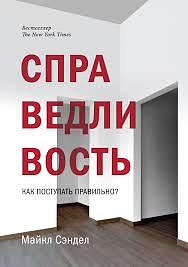Take a photo of a barcode or cover
challenging
informative
inspiring
reflective
fast-paced
This book took me awhile to read, despite its very accessible writing, because it's full of weighty things that I wanted to give serious thought to. The author is a professor of Government at Harvard who has long been teaching a course entitled Justice, that examines a wide array of political and philosophical thought from Aristotle to Rawls and how it relates to the real world. The book is well-written, very accessible despite its deep thoughts, with lots of examples taken from current events. A great primer on these issues.
You can also view Sandel's lectures for the Justice course at http://www.justiceharvard.org/ or through iTunes.
Highly recommended.
You can also view Sandel's lectures for the Justice course at http://www.justiceharvard.org/ or through iTunes.
Highly recommended.
Michael Sandel’s Justice: What’s the Right Thing to Do? is a masterful blend of philosophy, real-world application, and balanced analysis. I appreciate how Sandel takes abstract philosophical concepts and grounds them in contemporary, relatable examples. From utilitarianism to Kantian ethics, he shows how these ideas influence everyday dilemmas and policies. Sandel’s clear and engaging writing style makes complex ideas approachable without oversimplifying them, a feature that’s missing in many similar books. For readers intimidated by philosophy, this book serves as a perfect entry point. The book’s exploration of how philosophical frameworks shape real-world policies—like affirmative action, same-sex marriage, or taxation—is a unique strength. It demonstrates the practical relevance of these theories and invites readers to see philosophy as more than just an academic exercise.
Sandel’s fairness in presenting multiple sides of controversial issues is a key virtue of the book. By engaging with opposing viewpoints, he encourages readers to think critically rather than steering them toward a specific conclusion. The book is also very thought-provoking and inspiring. It challenges assumptions and encourages self-reflection without being preachy—a rare and valuable quality.
Sandel’s fairness in presenting multiple sides of controversial issues is a key virtue of the book. By engaging with opposing viewpoints, he encourages readers to think critically rather than steering them toward a specific conclusion. The book is also very thought-provoking and inspiring. It challenges assumptions and encourages self-reflection without being preachy—a rare and valuable quality.
Sandel teases apart the many interwoven schools of thought and philosophies that inform society's idea of moral justice. I believe it is important to examine and reflect on our own perception of justice and understand where it is rooted in. Working in a women's rights organisation I am aware of the schools of thought that inform the ideas of justice that we have fit our type of feminism into, scaffolded by the beliefs of the founders, as well as the context of the country.
Sandel explores justice as a duty, contrasted with justice practiced through utilitarianism. Justice as a duty meant that justice is a moral right because human beings are rational beings, worthy of respect and dignity. This is contrasted with the idea of utilitarianism, which states that justice means maximising the total sum of happiness experienced in any given situation (baring harming someone). Another philosophy contrasting utilitarianism is libertarianism, which central claim is human freedom to do whatever we want with the things we owe. He goes on to break down our idea of equality, not just in terms of what that entails - which is what directly informs our current social structure and what people talk about - but why and how we have decided that equality matters. He discusses the idea of deservedness, loyalty (to our own ingroups) and correcting past wrongs as part of the equality conversation.
What Sandel does with each of these philosophies is to take real life scenarios and demonstrate how decisions are made collectively by societies based on these unspoken, yet majority-agreed upon rules. Why do we feel that some things cannot be bought and some things should? Laws around surrogacy has been hotly debated because while in principle, the libertarian idea that people have freedom to do what they want sounds great, reality is that of exploitation and oppression, and many, if not all of us (depending on what you subscribe to) don't make choices that are absolutely free.
As someone who is an amateur in philosophy and ethics, this is a great starter text.
Sandel explores justice as a duty, contrasted with justice practiced through utilitarianism. Justice as a duty meant that justice is a moral right because human beings are rational beings, worthy of respect and dignity. This is contrasted with the idea of utilitarianism, which states that justice means maximising the total sum of happiness experienced in any given situation (baring harming someone). Another philosophy contrasting utilitarianism is libertarianism, which central claim is human freedom to do whatever we want with the things we owe. He goes on to break down our idea of equality, not just in terms of what that entails - which is what directly informs our current social structure and what people talk about - but why and how we have decided that equality matters. He discusses the idea of deservedness, loyalty (to our own ingroups) and correcting past wrongs as part of the equality conversation.
What Sandel does with each of these philosophies is to take real life scenarios and demonstrate how decisions are made collectively by societies based on these unspoken, yet majority-agreed upon rules. Why do we feel that some things cannot be bought and some things should? Laws around surrogacy has been hotly debated because while in principle, the libertarian idea that people have freedom to do what they want sounds great, reality is that of exploitation and oppression, and many, if not all of us (depending on what you subscribe to) don't make choices that are absolutely free.
As someone who is an amateur in philosophy and ethics, this is a great starter text.
I am not in the habit of shilling books out here. However, I will make an exception to this one. Adapted from a Harvard course, this book talks about everything from affirmative action to patriotism and euthanasia with lucid examples and clear prose. This is not a dry textbook about philosophy or law you don't care about. It is relevant and illuminating. I guarantee that you will get through this book with a different perspective on something that you thought you believed in. Each argument presented in the book is something relatable which was on the news recently and while you may disagree with some of the conclusions, this will definitely open up your mind. If you want to read one book on Politics and Law, let this be it.
challenging
informative
reflective
medium-paced
No suelo leer "no-ficción", pero el profesor Sandel es un genio.
Achei uma ótima introdução ao que é justiça, com exemplos, explicações claras e discussões que dão toda a margem para quem lê tirar as próprias conclusões. A falta de julgamentos óbvios, mas que enviesariam o conteúdo, foi bastante animadora.
Para discutir o que achamos justo, de onde vem nosso conceito de justiça ou vários outros tópicos mais abstratos ou relacionados ao nosso comportamento, Michael Sandel usa os conceitos propostos por filósofos para embasar a discussão. Seria uma leitura completa até 2010, mas em tempos recentes isso deixa um buraco muito claro no centro do livro. Muito dessa discussão seria resolvido (ou mesmo dispensado) com os conceitos de comportamento humano (sistemas 1 e 2) do [b:Rápido e Devagar: Duas Formas de Pensar|16152814|Rápido e Devagar Duas Formas de Pensar|Daniel Kahneman|https://images.gr-assets.com/books/1375463206s/16152814.jpg|16402639].
Nosso entendimento de como pensamos avançou bastante recentemente e Justice ainda foi concebido antes disso, ou sem boa parte dessa informação. Acho uma boa base sobre de onde vêm o conceito de justiça e como pensam juristas e quem trabalha com isso. Mas [b:The Righteous Mind: Why Good People are Divided by Politics and Religion|11324722|The Righteous Mind Why Good People are Divided by Politics and Religion|Jonathan Haidt|https://images.gr-assets.com/books/1351393217s/11324722.jpg|16252969] faz um trabalho melhor de amarrar as duas pontas, como pensamos com como legislamos.
Para discutir o que achamos justo, de onde vem nosso conceito de justiça ou vários outros tópicos mais abstratos ou relacionados ao nosso comportamento, Michael Sandel usa os conceitos propostos por filósofos para embasar a discussão. Seria uma leitura completa até 2010, mas em tempos recentes isso deixa um buraco muito claro no centro do livro. Muito dessa discussão seria resolvido (ou mesmo dispensado) com os conceitos de comportamento humano (sistemas 1 e 2) do [b:Rápido e Devagar: Duas Formas de Pensar|16152814|Rápido e Devagar Duas Formas de Pensar|Daniel Kahneman|https://images.gr-assets.com/books/1375463206s/16152814.jpg|16402639].
Nosso entendimento de como pensamos avançou bastante recentemente e Justice ainda foi concebido antes disso, ou sem boa parte dessa informação. Acho uma boa base sobre de onde vêm o conceito de justiça e como pensam juristas e quem trabalha com isso. Mas [b:The Righteous Mind: Why Good People are Divided by Politics and Religion|11324722|The Righteous Mind Why Good People are Divided by Politics and Religion|Jonathan Haidt|https://images.gr-assets.com/books/1351393217s/11324722.jpg|16252969] faz um trabalho melhor de amarrar as duas pontas, como pensamos com como legislamos.
I really enjoyed Sandel's political theory book. It is extremely well-organized and far more approachable than many political theory books, yet is also very rich. I appreciate the way he breaks down three approaches to justice: utilitarian, libertarian/liberal egalitarian, and an Aristotelian perspective on the common good. Yes, of course he has his own thesis on which form is most fitting, but I learned a lot along the way and his argument is clear and well-rounded.
challenging
hopeful
informative
inspiring
reflective
medium-paced


